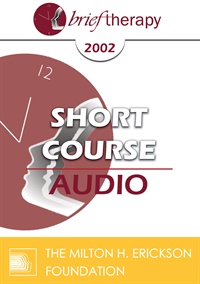
- Average Rating:
- Not yet rated
- Topic Areas:
- Short Courses | Brief Therapy | Family Therapy | Relationships | Strategic Therapy
- Categories:
- Brief Therapy Conference | Brief Therapy Conference 2002
- Faculty:
- Les Blondino, LPC, LMFT
- Duration:
- 1:17:05
- Format:
- Audio Only
- Original Program Date:
- Dec 12, 2002
- Short Description:
- Erickson recognized the vital importance of changing the client's relationships within their social contexts. Frequently, he included the client's family, friends and others to make therapy briefer with more permanent positive outcomes. Participants will learn ways to better understand the influence of social contexts, engage the social network and influence relationships to promote change. Case analogies will be given and videotape examples from actual session demonstrate the Strategic Family Therapy approach.
- Price:
- $15.00 - Base Price
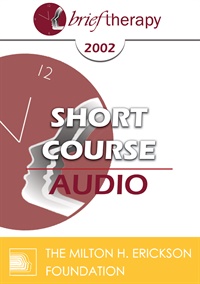
- Average Rating:
- Not yet rated
- Topic Areas:
- Short Courses | Group Therapy | Brief Therapy | Experiential Therapy | Family Therapy
- Categories:
- Brief Therapy Conference | Brief Therapy Conference 2002
- Faculty:
- Charles Bruder, PhD | Kimball DelaMare, LCSW | Jared Balmer, PhD | Rick Jackson, MD
- Duration:
- 1:01:43
- Format:
- Audio Only
- Original Program Date:
- Dec 12, 2002
- Short Description:
- This workshop will present a new model for delivering highly effective family therapy in a very brief time period utilizing multi-family group therapy workshops. A literature review as well as outcome research data will be presented along with audio-visual material to increase attendees' experiential understanding of the process.
- Price:
- $15.00 - Base Price
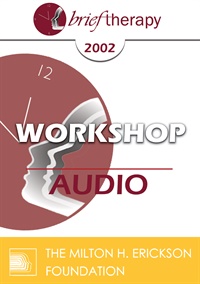
- Average Rating:
- Not yet rated
- Topic Areas:
- Workshops | Brief Therapy | Children and Adolescent Therapy | Family Therapy | Redecision Therapy
- Categories:
- Brief Therapy Conference | Brief Therapy Conference 2002
- Faculty:
- Mary Goulding, MSW
- Duration:
- 2:14:20
- Format:
- Audio Only
- Original Program Date:
- Dec 14, 2002
- Short Description:
- Volunteers from the audience will create one-act dramas and family sculptures from childhood scenes in order to understand their early decisions and make desired changes in their lives today.
- Price:
- $15.00 - Base Price
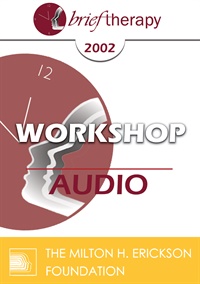
- Average Rating:
- Not yet rated
- Topic Areas:
- Workshops | Brief Therapy | Children and Adolescent Therapy | Family Therapy
- Categories:
- Brief Therapy Conference | Brief Therapy Conference 2002
- Faculty:
- Jon Carlson
- Duration:
- 2:25:07
- Format:
- Audio Only
- Original Program Date:
- Dec 15, 2002
- Short Description:
- Mental health experts are frequently called upon to work with parents and teachers. This workshop describes how most interventions are ineffective and will provide a brief procedure that works. The seven-step model will be discussed and videotaped examples will be provided.
- Price:
- $15.00 - Base Price
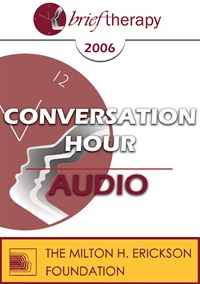
- Average Rating:
- Not yet rated
- Topic Areas:
- Conversation Hours | Children and Adolescent Therapy | Family Therapy | Brief Therapy | Strengths-Based
- Categories:
- Brief Therapy Conference | Brief Therapy Conference 2006
- Faculty:
- Matthew Selekman, MSW
- Duration:
- 1:00:49
- Format:
- Audio Only
- Original Program Date:
- Dec 08, 2006
- Short Description:
- BT06 Conversation Hour 02 - Collaborative, Strengths-Based Therapy with Self-Harming Adolescents & Their Families - Matthew Selekman, MSW
- Price:
- $15.00 - Base Price
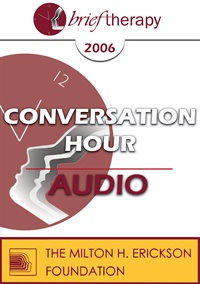
- Average Rating:
- Not yet rated
- Topic Areas:
- Conversation Hours | Abuse | Family Therapy | Brief Therapy
- Categories:
- Brief Therapy Conference | Brief Therapy Conference 2006
- Faculty:
- Frank Dattilio, PhD, ABPP
- Duration:
- 1:02:13
- Format:
- Audio Only
- Original Program Date:
- Dec 08, 2006
- Short Description:
- BT06 Conversation Hour 09 - Abuse in Families - Frank Dattilio, PhD, ABPP
- Price:
- $15.00 - Base Price
Tags: Abuse Brief Therapy Family Therapy
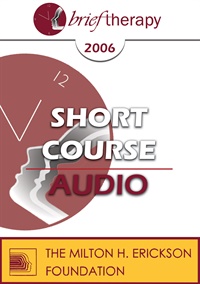
- Average Rating:
- Not yet rated
- Topic Areas:
- Short Courses | Multicultural | Brief Therapy | Family Therapy
- Categories:
- Brief Therapy Conference | Brief Therapy Conference 2006
- Faculty:
- Debra Ann Nixon, PhD
- Duration:
- 1:09:14
- Format:
- Audio Only
- Original Program Date:
- Dec 07, 2006
- Short Description:
- "Physician heal thyself" aptly describes this presentation for graduate supervisors/instructors who understand the need for increased diversity-mindedness amongst therapists. This presentation will focus on using proven pedagogical and therapeutic skills that will challenge graduate supervisors and instructors 1) to be self-relexive and diversity-minded and 2) to use themselves as the primary conduits of a new multicultural consciousness in teaching and supervision arenas.
- Price:
- $15.00 - Base Price
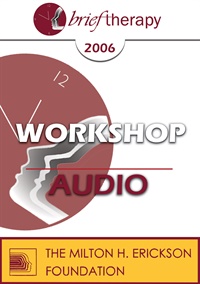
- Average Rating:
- Not yet rated
- Topic Areas:
- Workshops | Children and Adolescent Therapy | Abuse | Brief Therapy | Family Therapy | Strengths-Based
- Categories:
- Brief Therapy Conference | Brief Therapy Conference 2006
- Faculty:
- Matthew Selekman, MSW
- Duration:
- 2:30:03
- Format:
- Audio Only
- Original Program Date:
- Dec 09, 2006
- Short Description:
- Adolescent self-harming behavior is on the rise and one of the most challenging presenting problems therapists will face today in their clinical practice settings. Therapists referred these clients are often intimidated by their cutting and burning behaviors, the DSM IV labels they have been given, and the army of helping professionals involved with them and their families. many of these adolescents have experienced multiple treatment failures, feel emotionally disconnected from their parents, and come from families where there may be difficulties with marital or post-divorce conflicts, invalidating family interactions, gender power imbalance issues, or family secrets. In this hands-on, practice-oriented workshop, participants will learn a collaborative, strengths-based therapy approach that capitalizes on the strengths and resources of the adolescent, family members, concerned peers, adult inspirational others, and involved helpers from larger systems to rapidly co-construct solutions
- Price:
- $15.00 - Base Price
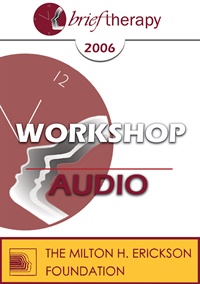
- Average Rating:
- Not yet rated
- Topic Areas:
- Workshops | Brief Therapy | Family Therapy | Multicultural | Cultural and Social Contexts
- Categories:
- Brief Therapy Conference | Brief Therapy Conference 2006
- Faculty:
- Patricia Arredondo, EdD
- Duration:
- 2:26:53
- Format:
- Audio Only
- Original Program Date:
- Dec 09, 2006
- Short Description:
- This session offers a grounded, experience-near look at working clinically with contemporary Latino families. Through cultural frameworks, lived examples, and extended case vignettes, participants explore values such as familismo, personalismo, respeto, machismo, and marianismo, alongside the real pressures of immigration, acculturation, gender roles, and shame. The work invites therapists to move beyond stereotypes, recognize strengths, and respond with cultural humility, practical strategies, and deeper attunement to family and generational dynamics in therapy.
- Price:
- $15.00 - Base Price
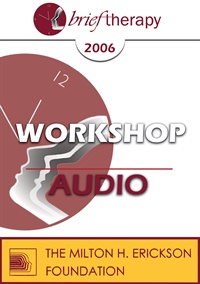
- Average Rating:
- Not yet rated
- Topic Areas:
- Workshops | Brief Therapy | Cognitive Behavior Therapy (CBT) | Family Therapy
- Categories:
- Brief Therapy Conference | Brief Therapy Conference 2006
- Faculty:
- Frank Dattilio, PhD, ABPP
- Duration:
- 2:00:45
- Format:
- Audio Only
- Original Program Date:
- Dec 09, 2006
- Short Description:
- This workshop focuses on the specific use of cognitive-behavioral strategies as an adjunct to the many treatment modalities of family therapy. It offers a basic overview of the theories of cognitive-behavioral therapy, particularly as it applies to families. Participants will learn first-hand techniques and strategies for working with difficult families and how to ingrate these strategies with their respective modes of treatment. Role-playing and case reviews will be used. A question and answer period will follow.
- Price:
- $15.00 - Base Price
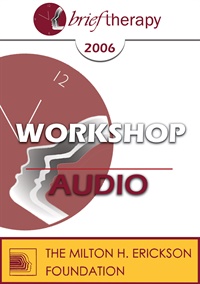
- Average Rating:
- Not yet rated
- Topic Areas:
- Workshops | Children and Adolescent Therapy | Family Therapy | Trauma | Brief Therapy
- Categories:
- Brief Therapy Conference | Brief Therapy Conference 2006
- Faculty:
- Kenneth Hardy, PhD
- Duration:
- 2:04:30
- Format:
- Audio Only
- Original Program Date:
- Dec 10, 2006
- Short Description:
- Ignoring the impact of trauma on the client's family overlooks powerful dynamics that are crucial to treatment outcome. Participants in this workshop will learn how to involve the trauma sufferer's partner and other family members as resources in the healing process. Participants will learn how to better educate clients about the typical symptoms of trauma, the stages of trauma recovery, how to help family members both soothe and set limits with the traumatized person, and the typical pitfalls families encounter - including the depleting response of "enough already" as a family member tries to heal from a trauma.
- Price:
- $15.00 - Base Price
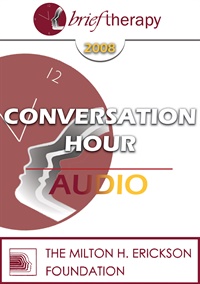
- Average Rating:
- Not yet rated
- Topic Areas:
- Conversation Hours | Brief Therapy | Family Therapy
- Categories:
- Brief Therapy Conference | Brief Therapy Conference 2008
- Faculty:
- Florence Kaslow, PhD, ABPP
- Duration:
- 32:36
- Format:
- Audio Only
- Original Program Date:
- Dec 13, 2008
- Short Description:
- BT08 Conversation Hour 02 - Consulting to Family Business - Florence Kaslow, PhD, ABPP
- Price:
- $15.00 - Base Price
Tags: Brief Therapy Family Therapy
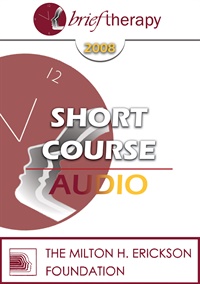
- Average Rating:
- Not yet rated
- Topic Areas:
- Short Courses | Love | Abuse | Children and Adolescent Therapy | Couples Therapy | Family Therapy | Hypnotherapy | Reframing
- Categories:
- Brief Therapy Conference | Brief Therapy Conference 2008
- Faculty:
- Ruperto Charles Torres, MA | Margarita Saez, MA | Ana Charles, MA
- Duration:
- 1:31:35
- Format:
- Audio Only
- Original Program Date:
- Dec 11, 2008
- Short Description:
- This workshop will offer a guide to understanding the inter-personal pattern of violent interactions. whether they may be between couples, parents and children, friends or co-workers. Effective strategies such as using positive questions, reframing comments, tasks, rituals and hypnotic procedures will be discussed.
- Price:
- $15.00 - Base Price
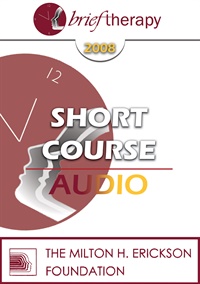
- Average Rating:
- Not yet rated
- Topic Areas:
- Short Courses | Brief Therapy | Relationships | Children and Adolescent Therapy | Family Therapy
- Categories:
- Brief Therapy Conference | Brief Therapy Conference 2008
- Faculty:
- Ramona Garnier, PhD
- Duration:
- 1:25:12
- Format:
- Audio Only
- Original Program Date:
- Dec 11, 2008
- Short Description:
- This presentation addresses the issues of teen anger and "acting out" from a brief therapy approach to treatment. Interventions psychotherapists can integrate into family therapy enhancing parent capabilities and encouraging improved relationships with their teens will be presented. An experiential exercise will be provided helping attendees integrate brief, goal-oriented approaches as well as hypnotic and strategic interventions.
- Price:
- $15.00 - Base Price
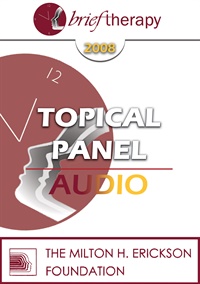
- Average Rating:
- Not yet rated
- Topic Areas:
- Topical Panels | Brief Therapy | Couples Therapy | Family Therapy
- Categories:
- Brief Therapy Conference | Brief Therapy Conference 2008
- Faculty:
- Jon Carlson | Stephen Karpman, MD | Florence Kaslow, PhD, ABPP | Matthew Selekman, MSW
- Duration:
- 1:05:14
- Format:
- Audio Only
- Original Program Date:
- Dec 13, 2008
- Short Description:
- BT08 Topical Panel 05 - Brief Therapy with Couples and Families - Jon Carlson, PsyD, EdD, Stephen Karpman, MD, Florence Kaslow, PhD, ABPP, Matthew Selekman, MSW
- Price:
- $15.00 - Base Price
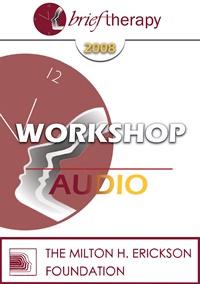
- Average Rating:
- Not yet rated
- Topic Areas:
- Workshops | Children and Adolescent Therapy | Family Therapy | Brief Therapy | Strengths-Based
- Categories:
- Brief Therapy Conference | Brief Therapy Conference 2008
- Faculty:
- Matthew Selekman, MSW
- Duration:
- 1:30:04
- Format:
- Audio Only
- Original Program Date:
- Dec 12, 2008
- Short Description:
- In this "hands-on" practice-oriented workshop, participants will learn effective engagement strategies with children, empirically-based parent management skills, and several family play and art therapy strategies that tap the inventiveness of the child and his/her family members to generate new ideas and co-construct solutions.
- Price:
- $15.00 - Base Price
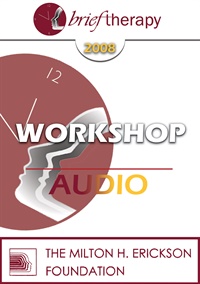
- Average Rating:
- Not yet rated
- Topic Areas:
- Workshops | Brief Therapy | Children and Adolescent Therapy | Divorce | Family Therapy
- Categories:
- Brief Therapy Conference | Brief Therapy Conference 2008
- Faculty:
- Florence Kaslow, PhD, ABPP
- Duration:
- 2:16:47
- Format:
- Audio Only
- Original Program Date:
- Dec 14, 2008
- Short Description:
- What are the differential impacts of divorce on children? This workshop will consider the thoughts, feelings, behavior, issues, concerns and needs of children in different age groups, from birth to 50 years, within the framework of the stages of the divorce process and for years afterwards. Lecture, discussion, clinical examples and role plays will be interspersed as efficacious interventions are considered.
- Price:
- $15.00 - Base Price

- Average Rating:
- Not yet rated
- Topic Areas:
- Couples Therapy | Family Therapy | Conversation Hours | Brief Therapy
- Categories:
- Brief Therapy Conference | Brief Therapy Conference 2010
- Faculty:
- Frank Dattilio, PhD, ABPP
- Duration:
- 1:03:01
- Format:
- Audio Only
- Original Program Date:
- Dec 11, 2010
- Short Description:
- BT10 Conversation Hour 06 - Couple and Family Therapy - Frank Dattilio, PhD, ABPP Couple and Family Therapy with Frank Dattilio
- Price:
- $15.00 - Base Price
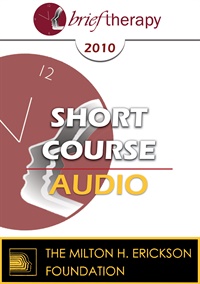
- Average Rating:
- Not yet rated
- Topic Areas:
- Family Therapy | Short Courses | Children and Adolescent Therapy | Brief Therapy | Strengths-Based
- Categories:
- Brief Therapy Conference | Brief Therapy Conference 2010
- Faculty:
- Bob Bertolino, PhD
- Duration:
- 1:31:15
- Format:
- Audio Only
- Original Program Date:
- Dec 09, 2010
- Short Description:
- Agencies are under pressure to prove outcomes, yet real change still hinges on human connection. In this practical session, Bertolino integrates strength-based practice, client feedback, and research on therapist effects to show how services can become both more accountable and more effective. Drawing from real agency data, he demonstrates how tracking progress, focusing on client strengths, and refining clinician skill can reduce dropout and improve results without sacrificing the heart of the work.
- Price:
- $15.00 - Base Price
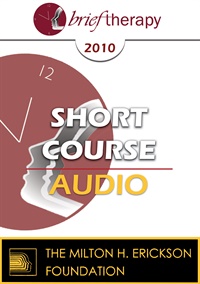
- Average Rating:
- Not yet rated
- Topic Areas:
- Family Therapy | Short Courses | Family Constellations | Brief Therapy | Trauma
- Categories:
- Brief Therapy Conference | Brief Therapy Conference 2010
- Faculty:
- Dan Booth Cohen, PhD
- Duration:
- 1:23:52
- Format:
- Audio Only
- Original Program Date:
- Dec 09, 2010
- Short Description:
- This workshop includes Systemic Family Constellation therapy. Redefined by Bert Hellinger and others, it has gained acceptance in Europe as a groundbreaking advancement in brief form therapy. The process explores how transgenerational traumas remain active. In a single session, the imaginal family system is transformed. The burden of memory becomes an enduring source of strength and healing.
- Price:
- $15.00 - Base Price
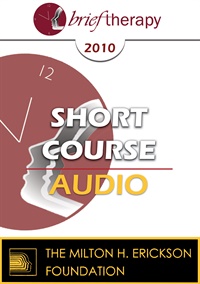
- Average Rating:
- Not yet rated
- Topic Areas:
- Short Courses | Brief Therapy | Couples Therapy | Family Therapy | Solution Oriented Approach
- Categories:
- Brief Therapy Conference | Brief Therapy Conference 2010
- Faculty:
- Michael Reiter, PhD | Arlene Brett-Gordon, PhD
- Duration:
- 1:20:35
- Format:
- Audio Only
- Original Program Date:
- Dec 09, 2010
- Short Description:
- This workshop will explain how solution-focused brief therapy can be used in a marathon session format to assist couples and families during turbulent points of their relationship. The workshop will highlight the structure and intricacies of solution-focused marathon sessions. By utilizing this format only one or two sessions may be necessitated. With Michael Reiter and Arlene Brett-Gordon.
- Price:
- $15.00 - Base Price
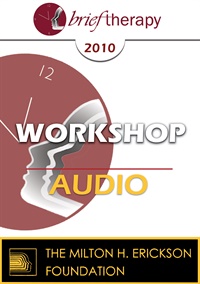
- Average Rating:
- Not yet rated
- Topic Areas:
- Trauma | Children and Adolescent Therapy | Family Therapy | Workshops
- Categories:
- Brief Therapy Conference | Brief Therapy Conference 2010
- Faculty:
- Kenneth Hardy, PhD
- Duration:
- 1:38:18
- Format:
- Audio Only
- Original Program Date:
- Dec 09, 2010
- Short Description:
- BT10 Workshop 03 - Children, Families, and Trauma: A Relational Approach - Kenneth Hardy, PhD Ignoring the impact of the trauma on the client’s family overlooks powerful dynamics that are crucial to treatment outcome. Participants in this workshop will learn how to involve the trauma sufferer’s partner and other family members as resources in the healing process.
- Price:
- $15.00 - Base Price
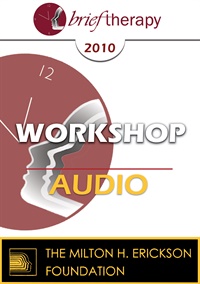
- Average Rating:
- Not yet rated
- Topic Areas:
- Cognitive Behavior Therapy (CBT) | Family Therapy | Workshops
- Categories:
- Brief Therapy Conference | Brief Therapy Conference 2010
- Faculty:
- Frank Dattilio, PhD, ABPP
- Duration:
- 1:44:27
- Format:
- Audio Only
- Original Program Date:
- Dec 09, 2010
- Short Description:
- BT10 Workshop 10 - Cognitive-Behavioral Techniques with Families - Frank M. Dattilio, PhD, ABPP This workshop focuses on the specific use of cognitive-behavioral strategies as an adjunct to the many treatment modalities of family therapy. It offers a basic overview of the theories of cognitive-behavioral therapy, particularly as it applies to families. Participants will learn first-hand techniques and strategies for working with difficult families and how to integrate these strategies with their respective modes of treatment. The presentation is followed by a videotape that demonstrates the implementation of techniques and interventions.
- Price:
- $15.00 - Base Price
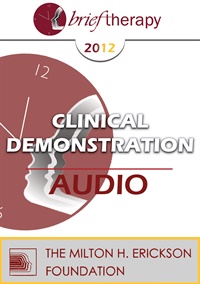
- Average Rating:
- Not yet rated
- Topic Areas:
- Family Therapy | Hypnosis | Clinical Demonstrations
- Categories:
- Brief Therapy Conference | Brief Therapy Conference 2012
- Faculty:
- Camillo Loriedo, MD, PhD
- Duration:
- 57:05
- Format:
- Audio Only
- Original Program Date:
- Dec 07, 2012
- Short Description:
- BT12 Clinical Demonstration 04 - Hypnosis and Family Therapy - Camillo Loriedo, MD, PhD Specific direct and indirect techniques are required to activate family resources and to induce a deep and meaningful change of the most rigid family patterns. Indirect as well as direct forms of hypnosis to be used in the family interview will be presented and special attention will be dedicated to the criteria to follow in order to combine properly direct and indirect in the different phases of the therapeutic process.
- Price:
- $15.00 - Base Price
Tags: Family Therapy
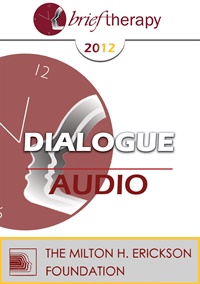
- Average Rating:
- Not yet rated
- Topic Areas:
- Family Therapy | Dialogues
- Categories:
- Brief Therapy Conference | Brief Therapy Conference 2012
- Faculty:
- Camillo Loriedo, MD, PhD | Frank Dattilio, PhD, ABPP
- Duration:
- 1:12:11
- Format:
- Audio Only
- Original Program Date:
- Dec 07, 2012
- Short Description:
- BT12 Dialogue 05 - Brief Therapy and Families - Frank Dattilio, PhD, Camillo Loriedo, MD, PhD Educational Objectives: Given a topic, describe the differing approaches to psychotherapy, and identify the strengths and weaknesses of each approach.
- Price:
- $15.00 - Base Price
Tags: Family Therapy

